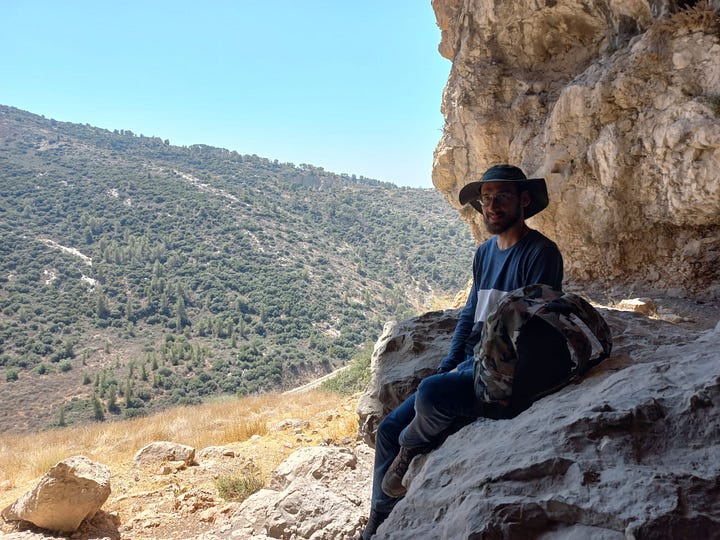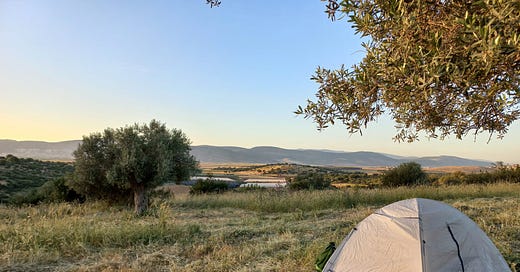Relax, On Purpose
Healthy living is deeply calming, not a recipe for stress.
Dear Healthy Jew,
In Healthy Jew’s first post, which we’ve since revisited many times, we hearkened to Maimonides’ call1 to take our health seriously – not only to make a good life possible, but because choosing wellness is where good, human choices begin. An animal reacts to external stimuli by instinct, while a person uses his mind to guide his body’s actions toward the purpose of healthy living.
Practically applied, this Purpose of Wellness Doctrine demands constant awareness, to always respond consciously and never react mindlessly. Such a mode of living initially feels attractive and inspiring. But once reality sets in, which probably will happen before you finish this article, it might seem more of a burden than an opportunity, perhaps even severe and unnatural.
If the notion of endless concentration leaves you feeling more anxious than excited, I’m with you. It sounds to me like a recipe for stress and distress. After all, one definition of stress is the perception of threat, and what can be more threatening than needing to ponder the purpose of every single action before taking it?
Maimonides was aware of this difficulty, because he concluded that investing intention into every action is a spiritual level akin to that of prophet, conceding that it’s “very high and hard, and only a few will achieve it.”
What shall we do? We don’t want to remain animals, but fully graduating into humanity seems too much to ask.
The simple solution is to just accept the reality. We can’t fully choose humanity forever, but we can set the destination toward which we journey today, one faltering step at a time. When my breakfast choices are guided by what’s good for me, and not the enhanced image of sugar-coated corn pops calling out from the shelf, I’ve grown in humanity – and taken a small but real step in the direction of prophecy. Maybe lunchtime I’ll regress, but supper I can choose to climb back on the wagon.
In short, Healthy Jew isn’t (for most of us) a thing to be, but an unfolding process of becoming, which isn’t so scary, because I’ve chopped the impossible goal of perfection into bite-sized (literally!) gradations of growth. Instead of playing prophet, I’m striving to be a better person: happily walking the road toward prophet-life, but aware that I probably won’t make it all the way.


Yet this is not the whole story. Even without modifying the goal of complete purposefulness, Maimonides’ challenge needn’t be a source of stress. To the contrary, when understood correctly, purposeful living is deeply calming.
All that’s needed is to broaden our definition of health to include stress reduction – not an extreme proposition, considering that reams of research show how stress is extremely unhealthy. Once purposeful living includes relaxation, it no longer equals anxiety.
Personhood doesn’t demand that we constantly stand on guard, never letting go to simply be with our sensory experiences. It only asks that we direct our intent toward good health, and good health includes recreation. Rest well, says our souls – but with purpose.
I’m not making this up. When Maimonides described the Purpose of Wellness Doctrine, he first explained how flavor is a poor arbiter of healthful purpose when choosing what to eat, but then plopped taste right back on the table:
…or he’ll aim for the delicious for health reasons. For example, if his appetite is weak, he’ll arouse it with desirable foods that are delicious and spicy. If melancholy falls on him, he’ll remove it by listening to songs and musical instruments, strolling in gardens and beautiful buildings, sitting amongst beautiful forms, and similar spirit-expanding things.
Healthy people eat well and have abundant energy to meet life. Emotional states that reduce appetite and induce depression are treated by purposely seeking a broad variety of sensory stimulations and pleasures.

But this advice isn’t only for the pathologically emotionally deficient.
Maimonides added that choosing only for wellness will eliminate much of a person’s struggles, because, in his example, he won’t be so desperate to cover his house and weave his clothing with gold.
Unless he’s doing so for the purpose of:
expanding the spirit so it will be healthy, and its illnesses expunged, and it will be clear and pure to receive wisdom. The Sages spoke of “a beautiful house, beautiful wife, and a bed with linens for the Torah scholar.”
What causes the scholar to exchange his Talmud for the lounge chair? The healthy mind itself:
Relentlessly researching hard subjects drains the spirit and muddies the mind. The body tires from engaging in draining work, and when it rests and is quiet, it returns to balance. So too the spirit must rest and engage in relaxing the senses with activities like looking at pictures and beautiful things, until its exhaustion is lifted. The Sages too referred to “when the Rabbis became weak from study.”
In such situations, the desire to engrave and decorate buildings, vessels, and clothing isn’t bad, and acting on it isn’t nothingness.

What magnificent irony! Living by the mind’s guidance is what makes us human, and part of that guidance is to rest the mind by sometimes letting go of hard mind-work and dwelling in the body and its sensations.
Such purposeful relaxation, obviously, will look quite different than hollow escape. The details will vary greatly between people; some will go hiking or camping, others will go out to eat or enjoy a movie. If you don’t know where to start, maybe try one of Maimonides’ examples. But no one will need to sacrifice their dignity, or their purposefulness.


One Suggestion: Notice when you feel drained from mind-living. Then use your mind to choose ways to rest your mind by taking good care of your physical body.
Thank you for reading Healthy Jew.
Here are 2 great paths to continue the journey:
Also check out this intro and index to explore hundreds of posts about our 3 Healthy Jew topics: Wellness with Wisdom, Land of Life (Israel), and Sensible Spirituality.
Finally, always feel free to reach out here with any comments, questions, or complaints:
I look forward to hearing from you!
Be well,
Rabbi Shmuel Chaim Naiman
Please note: All content published on Healthy Jew is for informational and educational purposes only. Talk to a qualified professional before taking any action or substance that you read about here.
Introduction to Avon Chapter 5








